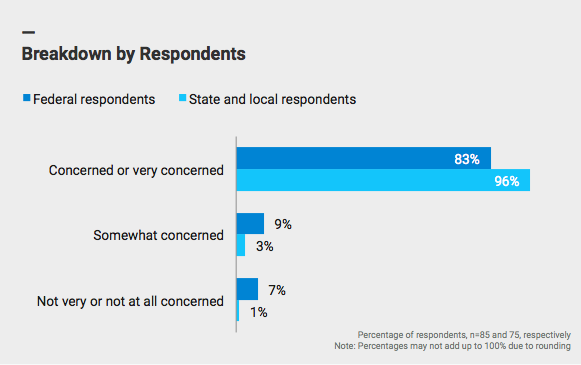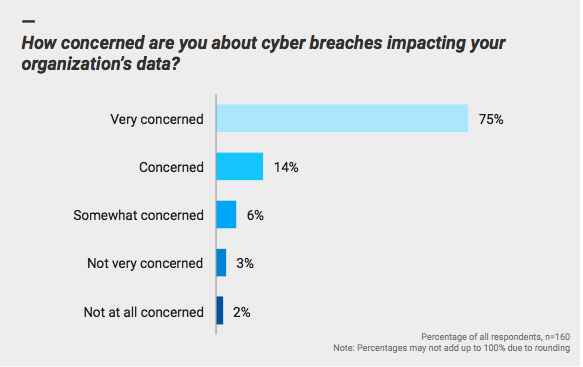Not nearly enough when every government employee is not fretting over cyber espionage most of all those at the State Department.
Nearly 9 in 10 Government Employees Concerned about Cyber Breaches in Their Organization
The public sector experienced nearly 50 times more cyber incidents than any other industry in 2014, and government agencies consistently cite implementing robust, agile cybersecurity measures as a top priority. As threats continue to evolve in both scale and capacity, it is increasingly essential that organizations devise and implement robust, agile measures to continuously detect, monitor, and address both external and internal vulnerabilities.
In an effort to learn more about the perspective of public sector employees on cybersecurity, Government Business Council conducted a flash poll on the following question:
GBC received responses from 160 federal, state, and local government employees. Nearly 90% stated that they were concerned or very concerned about the impact of cyber attacks; only 5% were not very concerned or not at all concerned about potential breaches. The results also reveal cybersecurity to be a more pressing concern for state and local organizations than for their federal counterparts: 96% of state and local respondents were concerned or very concerned about breaches, a 13-point difference from the percentage of federal employees expressing a similar level of concern. Lack of resources might make cybersecurity a more pressing issue for state organizations — according to a 2015 survey of state CIOs, 64% cited insufficient funding as a major barrier against addressing cyber threats, and 62% cited inadequate availability of security professionals. There is also a disconnect between perception of state cybersecurity capabilities and reality: while 60% of state officials had a high level of confidence in the ability of states to defend against attacks, only a quarter of state CISOs responded likewise. 
Moving forward, state and federal agencies should continue to invest in developing a cohesive cybersecurity strategy, recruiting and retaining personnel with the relevant skill set, and sharing threat information and best practices across organization. As federal CIO Tony Scott puts it, “Cyber threats cannot be eliminated entirely, but they can be managed much more effectively. And we can best do this by aligning and focusing our efforts, by properly funding necessary cyber investments, by building strong partnerships across government and industry, and by drawing on the best ideas and talent from across the country to tackle this quintessential problem of the 21st century.” GBC will revisit this topic in future research posts.
‘This was all planned’: Former IG says Hillary, State Dept. are lying
NYPost: The State Department is lying when it says it didn’t know until it was too late that Hillary Clinton was improperly using personal emails and a private server to conduct official business — because it never set up an agency email address for her in the first place, the department’s former top watchdog says.
“This was all planned in advance” to skirt rules governing federal records management, said Howard J. Krongard, who served as the agency’s inspector general from 2005 to 2008.
The Harvard-educated lawyer points out that, from Day One, Clinton was never assigned and never used a state.gov email address like previous secretaries.
“That’s a change in the standard. It tells me that this was premeditated. And this eliminates claims by the State Department that they were unaware of her private email server until later,” Krongard said in an exclusive interview. “How else was she supposed to do business without email?”
He also points to the unusual absence of a permanent inspector general during Clinton’s entire 2009-2013 term at the department. He said the 5½-year vacancy was unprecedented. Much more to Sperry’s summary is here.
What do the former military special forces have to say on the matter of Hillary and even some betrayal within their own ranks?
Sofrep: A source within the State Department confirmed with SOFREP back in 2012 that Hillary’s top aid within the department pre-interviewed people regarding Benghazi before they were interviewed by the State Department’s own internal Benghazi Accountability Review Board.
The problem with the State Department investigating itself is that the investigation produced no significant change in the dysfunctional leadership, nor did it hold people accountable for clear negligence (the top three at fault being Hillary Clinton, Charlene Lamb, and Patrick Kennedy). The organization continues to rot from the top down.
Hillary, in particular, shares something in common with former Navy SEAL Team 6 member Matt Bissonette: They both potentially disclosed top secret government information, a clear violation of her non-disclosure agreement and oath. They also share pending legal problems with the feds.
The federal government continues to aggressively pursue Bissonette and anyone associated with him for disclosures in his book “No Easy Day” and for new information found on his personal computer that Bissonette turned over to federal investigators. SOFREP knows of at least one additional active-duty member forced to retire early as a result of information found on Bissonette’s laptop. Will the same measure of justice and accountability be applied to the political celebrity and former Secretary of State Clinton?
In a recent New York Times article, the editorial board endorsed Hillary Clinton as an experienced presidential candidate.
As secretary of state, Mrs. Clinton worked tirelessly, and with important successes, for the nation’s benefit. She was the secretary President Obama needed and wanted: someone who knew leaders around the world, who brought star power as well as expertise to the table. The combination of a new president who talked about inclusiveness and a chief diplomat who had been his rival but shared his vision allowed the United States to repair relations around the world that had been completely trashed by the previous administration. -NY Times editorial board
Hillary leveraged her political star power to secure her position as secretary of state, a clear Democrat concession prize for losing to Obama last time around. It was likely her strategic plan to further build her resume, and wait things out until 2016. She did little to promote American diplomacy or secure global stability abroad (two pillars of the department’s mission statement).
This is a woman that will do and say anything to get what she wants. I have very little respect for her. I know what she said to me and she can say all day long that she didn’t say it. That’s her cross to bear. She knows that she knew what happened that day, and she wasn’t truthful, and that has come out in the last hearings — that she told her family one thing and was telling the public another thing. —Sister of fallen hero Glen Doherty, Kate Quigley Full article and video is here.

